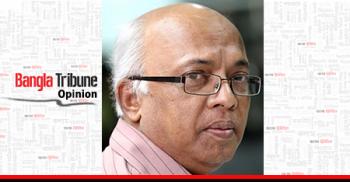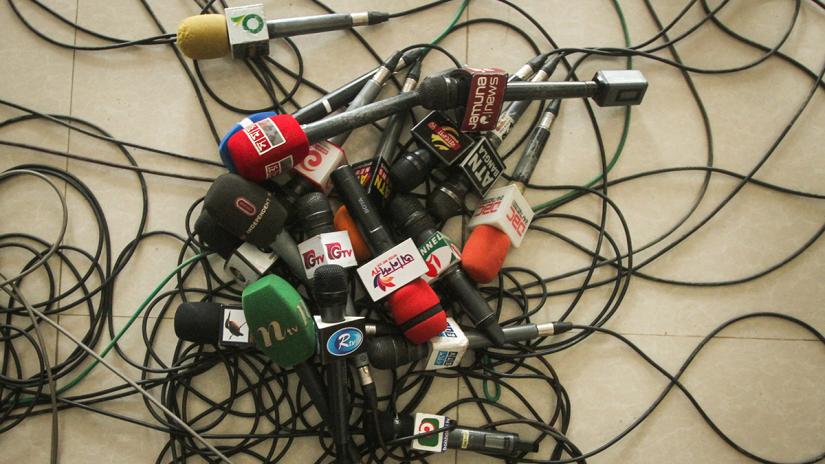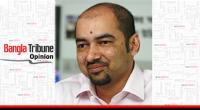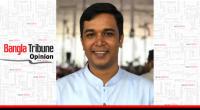 Free expression matters. And it matters enormously in the media, for the media is an embodiment of all those finer sentiments which go into an expression of the yearnings of the human soul. Those who hold aloft the banner of a free press, or struggle to keep it from keeling over into surrender before forces uncomfortable with a projection of the truth, are doing a job. And yet it is no ordinary job but a task geared to a preservation of all those rights which are natural to people, in terms of their birth; and fundamental, in terms of the laws of civilized conduct. That is what makes the media a powerful and necessary weapon for men and women, in all strata of society, to wield when free speech is threatened by those unhappy with a projection of ground realities.
Free expression matters. And it matters enormously in the media, for the media is an embodiment of all those finer sentiments which go into an expression of the yearnings of the human soul. Those who hold aloft the banner of a free press, or struggle to keep it from keeling over into surrender before forces uncomfortable with a projection of the truth, are doing a job. And yet it is no ordinary job but a task geared to a preservation of all those rights which are natural to people, in terms of their birth; and fundamental, in terms of the laws of civilized conduct. That is what makes the media a powerful and necessary weapon for men and women, in all strata of society, to wield when free speech is threatened by those unhappy with a projection of ground realities.
The media must speak truth to power. Equally important is its responsibility to speak truth to itself, for nothing is more galvanizing, nothing is more eloquent than the ability of journalism to take a hard look at itself and judge its actions on the same principles it applies to an observation and assessment of others. A free press, then, must go beyond its essential need to exercise the freedom that professionalism entails. In an age where politics and human rights and rule of law are cocooned into a state of the parlous, it is crucial to bear in mind the responsibility which comes with an exercise of journalistic freedom. While investigations into the nature of governance, into conflicting forms of global politics are a sacred duty the media must perform, it is at the same time of critical importance that the media exercise its prerogatives, indeed articulate its securely bound, well-considered judgment in a manner that does not raise questions about its style of operations. When controversy casts a shadow over journalism, it is an entirety of society which is left reeling from the shock. Scandal in the media is ambrosia for the corrupt. In large measure, though, it becomes the onerous responsibility of the media to apply its freedom to inquiries into issues of public importance, the better to enable the state and its institutions to take corrective measures. It is also the sacred task of a free media to ensure, where politics and governance do not maintain or are not permitted to maintain universally recognized standards, to remind governments of their responsibilities, to check them when they stumble or are callous about a fulfillment of the public interest. In effect, a free media is symbolic of a hard, ceaseless and long drilling into the deep — and deeper — holes where truth has been pushed under heaps of lies generated by arbitrary behaviour and authoritarian politics and bring it up into the light of the sun.
In large measure, though, it becomes the onerous responsibility of the media to apply its freedom to inquiries into issues of public importance, the better to enable the state and its institutions to take corrective measures. It is also the sacred task of a free media to ensure, where politics and governance do not maintain or are not permitted to maintain universally recognized standards, to remind governments of their responsibilities, to check them when they stumble or are callous about a fulfillment of the public interest. In effect, a free media is symbolic of a hard, ceaseless and long drilling into the deep — and deeper — holes where truth has been pushed under heaps of lies generated by arbitrary behaviour and authoritarian politics and bring it up into the light of the sun.
But the ability of the press to wield freedom in a search for and safeguarding of the truth depends on an absolute necessity to avoid collapsing into the murky pits of partisan journalism. The media is not on the left or on the right or even in the centre. It is, now and always, above. Where that is not the case, where journalists are tarred with the taint of political partisanship, the consequence is a woeful erosion of journalism, an instance of crass disrespect inflicted on the profession by its very messengers. Journalists must respect people, from the lowest rungs of society to the highest symbols of authority. But respect for others must come in complement with self-esteem, for media practitioners must not ignore the have-nots of society, must not genuflect before those who exercise political, economic, religious and social authority.
Asking questions is a prerogative of a free media. If and when answers do not come to those questions, the questions must be asked, again and again and again, until the needed responses bubble to the surface. Politeness is of essence here, in accompaniment with firmness. The journalist will not be intimidated, nor will intimidate. He/she must remain focused on the objective, for the objective relates to the need for transparency in governance, indeed in the day-to-day workings of society.
A free media cannot be anything but objective in its presentation of realities. A free media is not driven by the inanity of neutrality, for the neutral journalist is he/she afraid of voicing the truth. For the journalist, truth is the rampart on which journalism defends the fortress of reason.
Syed Badrul Ahsan is a journalist and author of biographies of Bangabandhu Sheikh Mujibur Rahman and Tajuddin Ahmad


